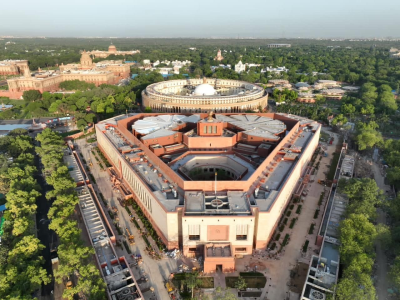New Delhi: A contingent of 140 CISF personnel has been deployed at the Parliament complex as part of the new measure to frisk the visitors and their baggage from the Budget Session that commences from January 31, official sources said.
The Union Home Ministry has sanctioned the strength after a comprehensive security review of the facility was undertaken in the wake of a breach by a few people, who entered the Parliament hall filled with MPs and sprayed coloured smoke canisters December 13 last year.
A total of 140 personnel of the Central Industrial Security Force (CISF) have taken charge at the Parliament complex from Monday. They will frisk the visitors, their belongings and also provide a fire safety cover to the building, sources told PTI.
An Assistant Commandant (AC) rank officer of the force will head the CISF unit that will have 36 personnel from the fire wing, sources said.
The contingent is undertaking familiarisation of the Parliament complex along with the other security agencies already present there so that they are ready for the task from January 31 when the Budget Session commences, they said.
The CISF will render access control to the new Parliament building in an airport-security-like fashion where body frisking of the persons and their belongings will be done through x-ray machines, hand-held detectors with a provision to even scan shoes, heavy jackets, and belts by putting them on a tray and passing them through the x-ray scanner, sources said.
The force has also written to the home ministry to sanction it this manpower of 140 personnel for Parliament security in a permanent manner.
“The current unit that has been deployed at the Parliament will be regularised under the Government Building Security (GBS) unit of the CISF that secures various government ministries and headquarters of probe agencies like the CBI and the ED,” a senior officer said.
The about 1.70 lakh personnel strong CISF is a central armed police force (CAPF) under the Union home ministry and it guards 68 civil airports of the country apart from vital installations in the aerospace and nuclear energy domain.
Sources had earlier told PTI that both the new and the old Parliament complex and their allied buildings will be brought under a comprehensive security cover of the CISF which will also have the existing elements of Parliament Security Service (PSS), the Delhi Police, and the Parliament Duty Group (PDG) of the CRPF.
It was after the 2001 terrorist attack on the Parliament that the CISF GBS came into being and it was entrusted with security of central government buildings in the national capital like the North and South blocks, Cabinet Secretariat, Vigyan Bhawan, UPSC building, the CGO complex, and other such buildings.
The charter of the GBS is to “maintain a high level of security, including contingency response, access control, and conduct of anti-sabotage checks”.
In a major security breach on the anniversary of the 2001 Parliament terror attack December 13 last year, two persons jumped into the Lok Sabha chamber from the public gallery during Zero Hour, released yellow smoke from canisters, and shouted slogans before being overpowered by the MPs.
Around the same time, two others sprayed coloured smoke from canisters while shouting slogans outside the Parliament premises.
Following this incident, a committee under the chairmanship of CRPF Director General Anish Dayal Singh is looking into the overall security issues of the Parliament complex and will make recommendations to the Union Home Ministry for improvement.
PTI
